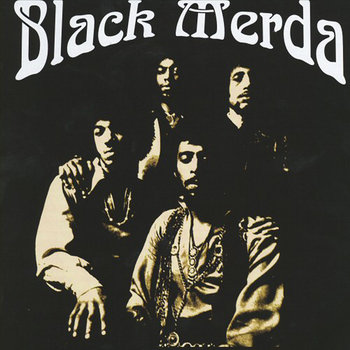
Black Merda Long Burn The Fire Rare
Black Merda were a funky rock combo with a significant debt to Jimi Hendrix, mixing fuzz-toned, psychedelic blues-rock with folky acoustic passages and contemporary late-'60s soul. Featuring guitarists Anthony and Charles Hawkins, bassist VC Veasey (aka Veesee L. Veasey), and drummer Tyrone Hite, the group got its start in the late '60s after Veasey, Hite, and Anthony Hawkins had spent time in a band called the Soul Agents, backing Edwin Starr and Gene Chandler. Inspired by Jimi Hendrix's Are You Experienced?, they added Anthony's younger brother Charles on second guitar and christened themselves Black Merda. Despite some interest around their Detroit base -- including Norman Whitfield and Eddie Kendricks -- Black Merda signed to Chess, thanks in part to the psychedelic soul eccentric Fugi (aka Ellington Jordan), who they also backed on his Mary, Don't Take Me on No Bad Trip LP for Chess. Black Merda's self-titled album sounded revolutionary enough, although the bandmembers were disappointed that it didn't reflect their heavy live shows.
Mandino was born December 12, 1923. /big.jpg) Census, he was named after his paternal grandfather. According to the 1930 U.S. He was the president of Success Unlimited magazine until 1976 and is an inductee of the National Speakers Association's Hall Of Fame.
Census, he was named after his paternal grandfather. According to the 1930 U.S. He was the president of Success Unlimited magazine until 1976 and is an inductee of the National Speakers Association's Hall Of Fame.
Check out Long Burn the Fire! By Black Merda! On Amazon Music. Stream ad-free or purchase CD's and MP3s now on Amazon.com. Black Merda is an American rock band from Detroit, active from the mid-1960s to the early 1970s and reuniting in 2005. The core band members are guitarist/vocalist Anthony Hawkins, bassist/guitarist/vocalist VC L. Veasey, and guitarist/vocalist Charles Hawkins, plus original drummer/vocalist Tyrone Hite. Hite was a native of Detroit; the Hawkins.
They then moved to the West Coast to continue playing with Fugi, but returned to Chicago to record a second album. Shortening their name to Mer-Da, the group returned in 1971 with Long Burn the Fire, a funkier outing that bore a likeness to early Funkadelic. The band quickly fizzled out, but over the next three decades, continued record-collector interest in the group eventually resulted in a reunion with Veasey, both Hawkins brothers, and Fugi, although Hite had died in 2004. Artist Biography by Steve Huey - All Music Guide.
Black Merda in 2008 (L-R Charles Hawkins, Anthony Hawkins, VC L. Veasey) In 2005, the Funky Delicacies label released the compilation disc, collecting all the songs from the two original albums, Black Merda and Long Burn the Fire. Thanks to the new attention brought by this compilation and a cult following that showed a growing interest in the obscure black rock of the early 1970s, the Hawkins brothers and Veasey reunited in 2005. (Hite had died in 2004). The reformed Black Merda has played at several festivals in Detroit and the surrounding region as well as New York’s Central Park SummerStage concerts series and The Ottawa Blues Festival in 2006. A compilation of rarities titled was released in 2006. The band has since released the albums (2006) and (2009).

The long-delayed appreciation for Black Merda’s influence was further reflected in 2005 when rapper sampled their 1972 track “Lying” as the backing track for “Exodus Intro” on his album. In 2007 The Detroit Metro Times named the 1970 track “Cynthy-Ruth” as one of The 100 Greatest Detroit Songs Ever! Further recognition was garnered when “Cynthy-Ruth” was featured in the HBO documentary The Nine Lives Of Marion Barry that aired in August 2009. Sampled “Cynthy-Ruth” for use in the track “Teriya King” on the 2009 album that he produced for Japanese rappers the. The band was featured in the Spinner.com article “In Living Color: 20 Important Black Rockers Past and Present” in 2010. “Take A Little Time,” the single from the 2009 album Force Of Nature, was featured on the compilation Heavy Soul in 2010.
Download ebook ini serius blog. Their self-titled 1970 debut album was chosen as one of “Detroit’s greatest hits that should have been” by the Detroit Metro Times (November 10, 2010, Music Issue).